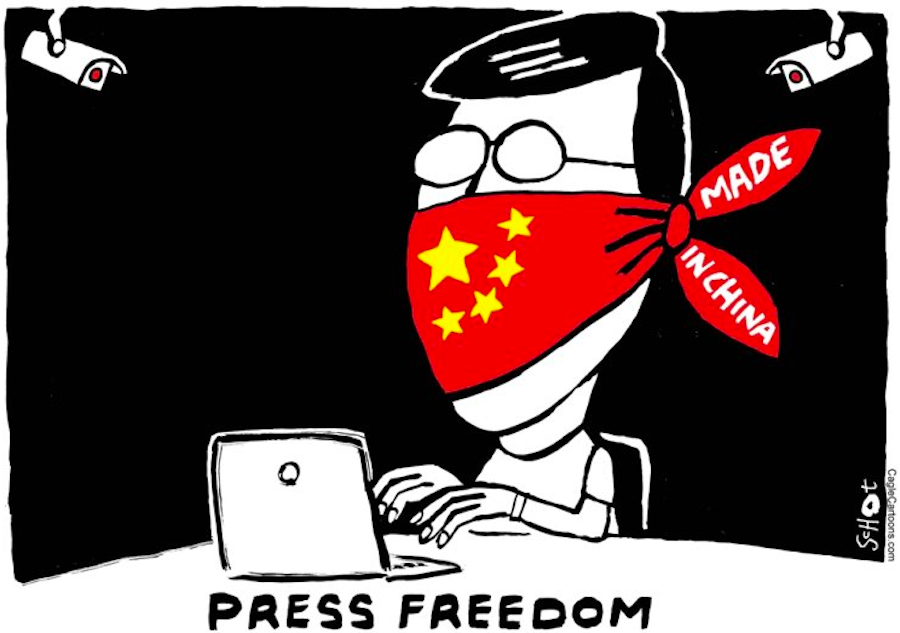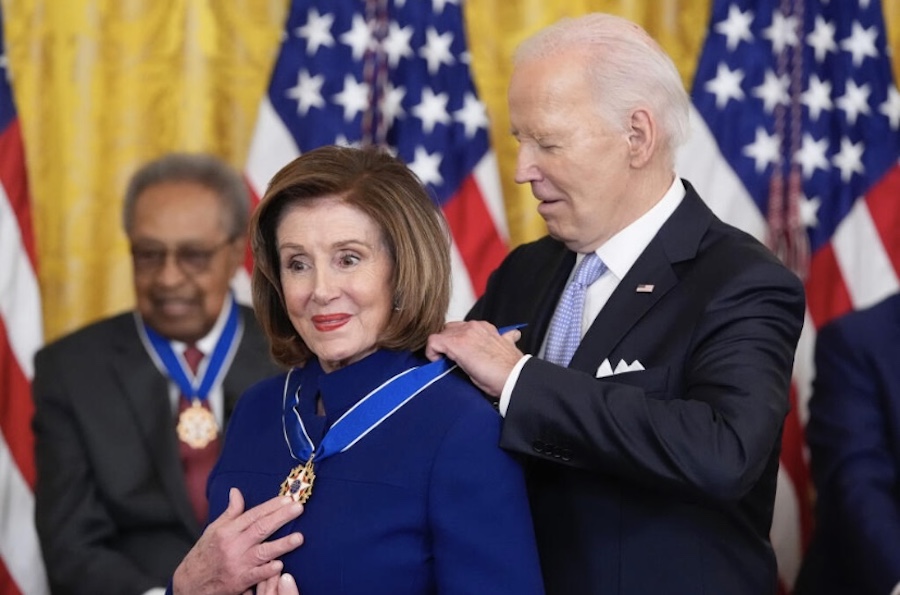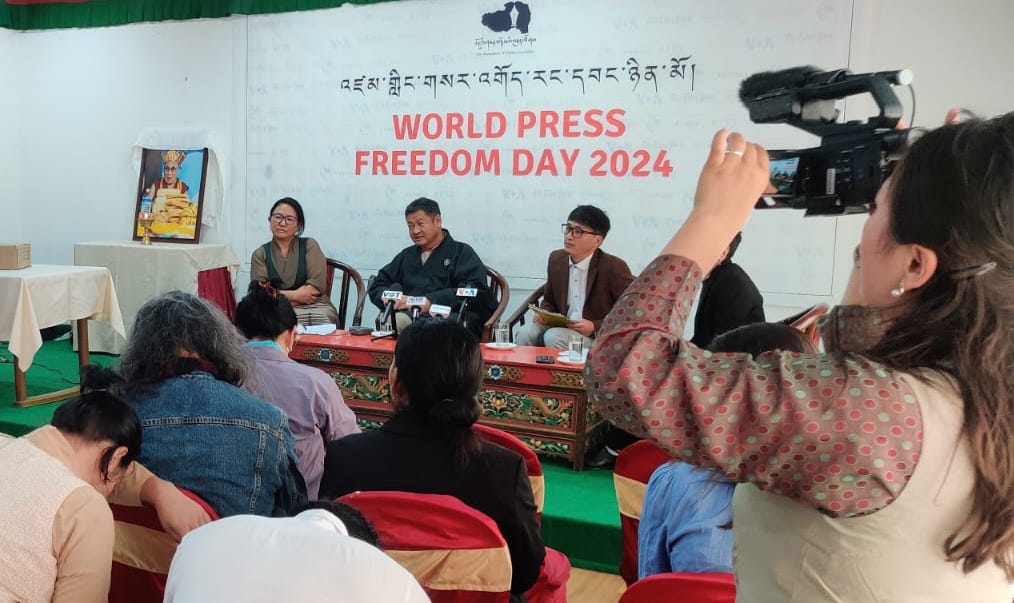Xin Chen of VOA’s Mandarin Service interviewed His Holiness the Dalai Lama at the Washington Hilton Hotel.
Below is a transcript of the entire interview as put up on the VOA website:
Xin Chen: Since you announced your retirement as leader of the Tibetan government-in-exile, how has your life changed?
Dalai Lama: Not much change, because the last ten years, since 2001, we have had political leadership through election. I would describe my position as the same since then. So, the main decisions are in the hands of the elected officials. Not my hand. So, not much change. Of course, mentally, now that we have relinquished all this political responsibility, I feel more free. And I can devote my energy to my other commitments. That is, number one, commitment as a human being. I consider it is important to be happy for life. The ultimate resource of happiness is within ourselves. Most of people say they are not looking in that way. Just money or some other material facility-that is the ultimate source of happiness. That is wrong. Of course we need material value, which is a necessity. But what is the source of happy life? So, it is my moral commitment to educate people [about this], it doesn’t matter if they are a religious believer or non-believer. Then my second commitment is [to promote] religious harmony. So, now I can spend more time on these two things.
 Xin Chen: How will your retirement impact the future negotiations between the Tibetan government-in-exile and the Chinese government? Will you disengage yourself from the process completely?
Xin Chen: How will your retirement impact the future negotiations between the Tibetan government-in-exile and the Chinese government? Will you disengage yourself from the process completely?
Dalai Lama: Oh yes. Definitely yes. I no longer hold that responsibility. In case the leadership needs my help, then I will be available.
Xin Chen: You have dealt with the Chinese leaders for the past 60 years. What lessons have you learned in dealing with them for the past six decades?
Dalai Lama: Hmmm, six decades. The first lesson, I am very much attracted to Marxism. So, at that time I very much wanted to join the Chinese Communist Party (laughs). Still, I am a Marxist. As I associate with the economic theory. So, that is one impact. Then of course, in the mid-50s, then things changed. Obviously, I am vehemently frustrated with hypocrisy. Saying something nice, but doing something different. And then too much suppression in the last 50 years. So, then I really respect and admire democracy and freedom.
Xin Chen: You have dealt with four generations of Chinese leaders, from Mao Zedong to Hu Jintao. And we know soon Mr. Xi Jinping will take over as the fifth generation leader. What are your observations of Mr. Xi and what are your hopes for him?
Dalai Lama: I don’t know much about Xi Jinping. Of course, his father I know quite well, Xi Zhongxun. Very nice, very jovial. But his son, I’ve never met, I don’t know. Some people say, his thinking is more like a younger person. So, his thinking some say is more open minded. But I don’t know.
Xin Chen: A lot of Chinese people feel the Chinese government has put tremendous resources into developing Tibet, and they cannot understand why there is so much discontent among Tibetans both inside and outside China. Do you think Tibetan people are ungrateful?
Dalai Lama: No, we are human beings. Even for Chinese people themselves, it is not sufficient to just give food, shelter. We are human beings. We love some other values. The Indian prime minister, when he visited to Washington, he mentioned the economy of India was behind the People’s Republic of China. But India has other fundamental values, that is democracy, freedom, rule of law, transparency, freedom of speech, freedom of press, these things are what China is lacking. So, these are fundamental values as human beings. Even Prime Minister Wen himself said that China economically is much more advanced, but now it is necessary for political reform. He openly stated. And like him, there are a lot of similar voices about freedom that are going on in China. So, there you see, Tibetans, firstly, are like any other human beings. We love freedom. There is too much restriction. Uncomfortable, that makes you. Then in Tibet’s case, we have our own language, own script, then in that language and script-a very rich religious tradition and religious philosophy. So, the local authority is putting restriction on these sorts of subjects. They want to block religion and culture, and that is a tremendous hurt. So, food and shelter are necessary, but the main thing is our culture, our own thousand-year old spirit. When someone doesn’t care, how does that feel?
Xin Chen: As you mentioned, the Chinese economy is the now second largest in the world. As a spiritual leader, what is your diagnosis of the spiritual state of the Chinese people today?
Dalai Lama: Oh, according to some information, a number of Chinese, including many party members, they are showing interest in spirituality more and more. And then, the last few years, you see more and more Chinese, Han brothers and sisters from mainland China coming to see me and many when we met were crying. They really genuinely expressed their interest about Buddhism. So, according to some information, the number of Buddhist believers in China is nearly 300 million. So, anyway, China has historically been a Buddhist country. When I was in China in 1954 and 1955, there were a lot of temples and monastaries. In a lot of countries that are materialistic, a number of cases where people who have everything, even millionaire and billionaires, but they find something missing. So, among these people, you see them gradually turning to spirituality. So, in China also the economy is reaching to another level, people will feel something missing-only money is insufficient. Also, you see the corruption, immerse corruption. It clears shows their lack of principle, moral principle.
Xin Chen: Talking about the younger generations in China, the younger generations in China face a lot of issues in their lives. Why do you think they should care about Tibet and what’s going on there?
Dalai Lama: Oh yes, not many Chinese care a lot about Tibet. So, the Chinese government has to take care.
Xin Chen: So, what is your message for them, the younger generation of Chinese about Tibet, about the future of Tibet and about the future relationship between China and Tibet?
Dalai Lama: I feel for those Chinese who have interest in Buddhism, Tibetan Buddhism and Buddhist culture, there is the potential to serve millions and millions of Chinese brothers and sisters. It is clear.
Xin Chen: Let’s move on to the world affairs. What are your views on what happened in the Middle East, the democratic movements in the Middle East during the past year? And how are they relevant for the Tibetan and Chinese people?
Dalai Lama: After all, since Berlin Wall disappeared, the world has witnessed that the totalitarian system has no future. After all, the world belongs to humanity, and each country belongs to the people, not one political party, or king or spiritual leaders. So, likewise China belongs to the people. So, the best way to govern the land and the people is by the people with the democracy system. It is the best. So, the future, the whole world has to go to more open society, and in a more democratic way.
Xin Chen: What are your views on the western intervention in the Middle East, for example the one in Libya?
Dalai Lama: First, things are quite complicated. We have to sort of study or judge from case to case. Like intervention in Iraq, Afghanistan, the motivation is very good. I know former President Bush, very nice person. His motivation, I know, very good. But the method created a lot of problems. So, we have to judge on the spot.
Xin Chen: How about the case in Libya?
Dalai Lama: Very complicated. The main concern is people, innocent people, suffer the most.
Xin Chen: You have four days left in Washington, and we haven’t heard about an invitation from the White House for a meeting. What is your thought on that?
Dalai Lama: My main reason to visit here, is to perform Buddhist teaching. In the meantime, I know the president very well, if there is an opportunity for a meeting, I am very happy.
Xin Chen: You had many rounds of dialogues with Beijing. What is the benefit of continued engagement with the Chinese leadership?
Dalai Lama: In many ways, there are many problems whether the Chinese government admits it or not. The whole world knows, the Chinese people also know there is a problem. They have to solve. It is foolish just to ignore that or use force. Sooner or later the central government must find the reasonable means to solve this problem. So, I believe it is a question of time, the central government will look at the problem realistically.
Xin Chen: You have announced your retirement. How about your successor? Will your successor be in any way involved in the political affairs?
Dalai Lama: No, actually my retirement means not just me personally, but also for the almost four century old tradition. The Dalai Lama institution, as the head for both political and spiritual, that I ended. Four century old tradition, as I mentioned earlier, is outdated. Tibet only belongs to Tibetan, not Dalai Lama or other spiritual tradition. So, the Tibetan government, or the organization that looks after Tibet and Tibetans, should be run in a democratic way. So, I deliberately and voluntarily ended the four century old tradition. In the future, in case the people want to keep this institution, then it will remain. But now, no question, the future Dalai Lama will not be involved in political leadership.
Xin Chen: Why did you end that now, not earlier, not later? Why now?
Dalai Lama: The time has passed, as I mentioned earlier, for such a position. Then, the elected Tibetan government has become quite mature. It’s essentially a democratic system. So, I thought, now is the time. My desire to change the system has been since my childhood. I know that the Tibetan system had been sort of backward-it must change. Now, I feel very happy.
Xin Chen: I know a lot of ancient cultures or native cultures have weakened or disappeared because of the market economy, globalization, urbanization, etc, etc. Are you optimistic about the future for Tibet’s culture and traditions?
Dalai Lama: The Tibetan culture is a culture of non-violence, a culture of peace, a culture of compassion. So, the culture is not only for Tibetans’ interest, but also for any people. Now, on this planet, I think more and more people are really fed up about violence, cheating, and exploitation. So, I think Tibetan culture is compassionate, honest, truthful. So, I think that kind of culture is something helpful. And particularly, millions of young Chinese get benefits from Tibetan culture if they paid more attention. Then Tibetan Buddhism, it is not just a religion, just a faith, it is an explanation about the human mind, about the human emotion, these things. Therefore, some top western scientists, they are really, seriously showing interest to learn about emotion and mind from the Tibetan Buddhist tradition. So, when science is growing, the concepts which mentioned in my tradition are also developing.
Xin Chen: You let us do this interview because you have a message for the Chinese people. What do you have to say to them?
Dalai Lama: China is an ancient nation with 5,000 years of cultural heritage. Chinese people are hard working, and generally speaking a religious people, which we respect and admire. So, Chinese people, while you are catching up with materialistic value, you should not forget your own thousands year old traditional values. That is very important.









